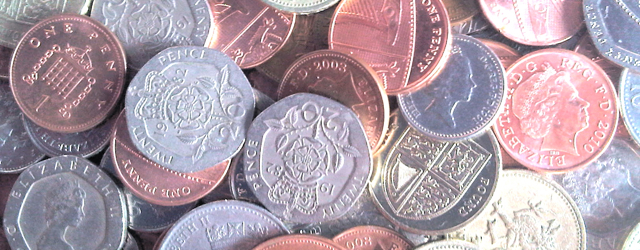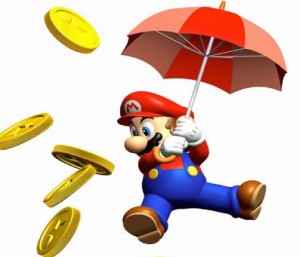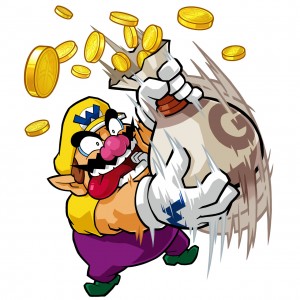
As a child, I always held issue with the price of games. (In fact, nothing’s changed, I still do.) While one of my few pleasures in life was forcing the sales assistant at Electronics Boutique to have to count out an entire £40 in 20p pieces, the length of time any one game could remain at its original price tended to drive me around the bend. I mean I knew that publishers had to make a profit on a game but when Pokémon Emerald was still at its original release price at a time when you can pick up Pokémon Diamond or Pearl from the adjacent shelf, the economics of gaming just seemed to baffle me.
Now all games can be overpriced now and again (cough, cough, Guitar Hero) but for some reason Nintendo’s games have a habit of staying at overly inflated prices up to years after their initial release. It’s sad really, looking at them still sitting their at full price as their third-party brethren understand their time in the sun is over and have accepted a healthy price cut in a bid to find someone to actually love them. Is this the retailers’ fault? Do they believe that no one will wait around several years to play Super Mario Galaxy 2 just to save £20? (Clearly they have not met me.)

It’s certain a possibility; Nintendo’s management style of their virtual stores on Wii and DS suggest that they may have some input into this phenomenon. Nintendo is well aware that its games have a unique excitement and quality to them and believes that, both in real life and and in the virtual market place, they can charge gamers whatever they like for it. While the whole platform of digital distribution makes me shift uneasily in my swivel chair on the best of days, the penny pincher within me can no longer idly sit back in said swivel chair and ignore this flagrant rip-off any longer. Nintendo’s high valuation of its own brand and digital distribution can only work against gamers, and it’s time to have an objective look.
When it initially launched, Nintendo enthusiasts were united in their enthusiasm for the Virtual Console (and later the Wii Shop Channel as a whole). How could access to our favorite games from history not be a great thing? And with WiiWare offering up brand new gaming experiences and finally presenting indie developers a shortcut into mainstream gaming, surely the Wii Shop Channel was the best thing that had ever happened to gaming.
No. While Nintendo’s distribution service offers players both new and old games for their Wii or DS, they are virtually without any market competition, offering up little motivation to remain ahead of the pack in terms of offering the best deals to customers. While gamers can easily walk out of a bricks and mortar (or online) store and take their business elsewhere, no such option exists on the virtual platform. If you want to buy the original Super Mario Bros. 3 for your Wii or …an Art Style game on your DS, then your only option is to go straight to Nintendo and buy it directly from them and them alone. And this, as I’m sure you can imagine, causes all sorts of problems.
As the single presence in a closed market, Nintendo faces zero competition and so isn’t required to either price their products competitively or offer exclusive deals to give them an edge over their rivals. Why sell something at an affordable (low profit) price when gamers have no other option but to come to you if they want it? Virtually, gamers are left with no choice and their lack of consumer power has only encouraged Nintendo to offer an overpriced, mediocre online service.

And when you add these advantages to the fact that Nintendo’s model isn’t restricted by the limitations of a commercially independent venture, such as having to sell redundant stock off and requiring a steady stream of new releases to maintain customers, it’s hardly surprising that the Wii and DS Shop Channels are nothing more than glorified, incomplete libraries with exorbitant borrowing fees. Since Nintendo doesn’t need to create any real revenue from their virtual stores (because they’re somewhat rolling in it as it is), where is the motivation to put in the extra effort to make these ventures both rewarding for the customer and truly profitable for the company?
It’s nowhere and it doesn’t even exist, loyalists. Because at the end of the day, a customer playing old Mario games is a customer who’s not buying new Mario games that return ten times as much profit. And why would Nintendo encourage a customer like that? Why would they let him actually try demos of these games first or pay a remotely valid price considering that the product is maddeningly obsolete and includes no updated features? Why would they not tell that gamer how many other people had bought the same game as him and actually release sales figures like any normal retailer would? Why would they not keep releasing games when there’s still a demand for them?
Frankly I’m not sure, but perhaps it’s worth taking a page out of Nintendo’s book on the whole matter. If the people in charge of digital distribution at Nintendo are being told that their diminutive customer base simply isn’t worth fussing over, then maybe we should take a similar stand. You won’t catch me throwing my money at them, that’s for sure.




 ShareThis
ShareThis







You nailed it, Adam. Excellent diagnosis. I am also disgusted when Nintendo does not lower its prices on titles after years of shelf life. Games such as Twilight Princess and Super Mario Galaxy should have lowered from $50 to $20 a long time ago. Things get even more ridiculous when you realize that seven major Pokémon titles spanning four years are still sitting in stores at their original prices side by side. Walking through the aisle at my local Target, I can’t help but to shake my head in shame over this debacle.
I’d certainly own a lot more games if Nintendo would stop milking dry cows. :{
I also think Nintendo’s requirement that a ‘Ware developer’s title sells a minimum number of copies before the developer sees any revenue is ridiculous as well. http://www.gamasutra.com/php-bin/news_index.php?story=22974 That’d make sense if Nintendo didn’t maintain such a stranglehold on the trickle of software released each week. Many developers don’t even know when their greenlit titles will be released. What kind of system is this?
Apple has been similarly criticized over its enigmatic app approval process, but at least far more items see the light of day on Apple’s store than Nintendo’s. Granted, less restrictions mean far more shovelware, but I’ve already seen plenty of shovelware on WiiWare already, so I don’t see the big advantage the pricing structure is rumored to address for quality.
Absolutely. And not only dropping prices, but also in re-releases. Take Super Mario All-Stars, for instance. How long did we wait for that one? Sure it was special edition (and limited time only, at that) but with no advancements in graphics or special add-ons, why wasn’t it just released on VC?
Simple: It’s a SNES game, which sells for, regularly, 800 points. It’s collective titles (SMB, LL, SMB2, SMB3) are selling for 2100 points. Which would you, as a merchant, rather make? But people want this title, so throw some extras in the box, slap it with “LE,” and now you can sell it for even more than the VC! It’s that simple!
I think the Super Mario All-Stars package is the wrong example to go to. Here’s the deal: The Special Edition Box comes with a translated Art & History Book and a special edition OST. Using your reasoning on SMA for a moment…
SNES titles are 800. This one is four “SNES games” in one, they could charge you the full 800 for each of the individual releases. So, you could be paying 3200 points for the whole package theoretically. Isn’t the game $29.99 retail?
So, you’re technically getting an Art & History Book with an added OST for free. That OST is at least a $10 to $15 value. $65 if you were buying the CD in Japan. The Art Book had to be translated, so there is the time and effort put into it that puts up the price. Oh, wait. You’re paying $29.99 for it. You’re getting a “bargain.” Actually, Nintendo sells that retail package at a loss if you put in effort, printing, parts, packaging, marketing, and that they sell it wholesale for $19.95. (Source: Navarre) The brick and mortar store gets almost $10 in profit from it. Of course that profit goes into paying employees, rent/lease, utility, and so forth. At the end of the day, they have to sell a bit to break even. The idea that Nintendo is “printing money” is one of the dumbest things out of the internet since Obama Voters and 9/11 Truthers.
That said, the article was interesting. Okay. Nintendo prices don’t go down when people are willing to pay them. When sales dwindle, the games go down in price if they didn’t sell. The price goes up or stays up when demand did not dwindle; but stock did. As for digital distribution? Isn’t Sony the only place to go to for games on PSN? Isn’t Microsoft the only company providing XBLA content on their marketplace? Last I checked, I can’t access the Android Market on an iPhone. What a monopoly! That said, Nintendo doesn’t do sales on Virtual Console titles or Wii Ware because of something I call “Precedent Purchasing.” Many customers do not purchase titles on Steam until a sale hits. Many people put off purchasing Apps on the Apple Store, games on PSN/XBLA; because they are waiting for sales. Nintendo has no sales. So, they do not give customers the “precedent” to wait for a price drop or a sale on their distribution. Does this seem wrong for customers? At first glance it does; but the most expensive titles are around 1200 points on DSi Ware and 1500 on Wii Ware. There are no $39.99 or higher titles like PSN/XBLA or $69.99 like on Steam. The prices are fixed on the Nintendo systems. The profit margin requirement is perfectly fair. Nintendo is providing the storage space, server location, download bandwidth, and -sometimes- Nintendo Channel promotion of that title. Think of the minimum sale requirement as being like a lease to own deal. You are paying for the initial costs of the service provided. After you pay that off, you keep every bit of profit made after it. You could make a terrible DSi Ware game; but you won’t make any money on it. Now, the scheduling and the lack of full promotion/demos is a good point of contention. It looks like Nintendo will fix that with the eShop.
Granted you offer some valid points regarding the SMA package (not that I mentioned it but I’ll happily argue the point.) Sure Nintendo aren’t probably making a massive profit on the bundle at first glance but the wider picture for that bundle is profit city. The only two types of people buying SMA are fanboys that already owned the original cartridges, the GBA remakes, the Virtual Consoles versions and now this. They’re collectors that will buy anything with Mario’s face on it and they’re easy money for Nintendo. Very little effort required.
The other customer is the adult Nintendo fan that probably doesn’t even have a Wii or if he does, doesn’t use it for gaming and the wife plays Wii Fit etc. He probably doesn’t even understand Virtual Console but look, all of the Mario games in one handy collection! And look, a whole raft of brand new and exorbitantly overpriced Mario games right next to it on the shelf. Can you say kerching?
And the soundtrack doesn’t have any “value” now, does it? Nintendo can charge however much it likes, doesn’t mean it’s worth anything. It’s a pile of music that had already been recorded and was just sitting about. Nintendo has a massive collection of content just waiting to be rebranded and repackaged and resold, it’s one of the companies biggest assets. And the cost of translation? I don’t know how big this artbook was but translators go through entire games, their manuals and their packaging on a daily basis. It was hardly gonna be a mammoth operation now, was it?
Nintendo could have put a lot more effort into the SMA bundle but they didn’t. Because then it would have cost money for them. If the bundle wasn’t a money spinner then it wouldn’t exist in the first place.
And on the principle of digital distrubtion, yes every other platform does have its own dedicated shop. But, like you said, they all have sales. When things aren’t selling, you cut the price. That’s kind of how capitalism works, no? I don’t understand what gives Nintendo the right to bypass this system and then swallow up the profits of anyone small enough not to fight back.
I mentioned the SMA bundle because of it being noted in the comments. You have to sell a certain amount of product over your initial cost to make a profit. Of course, profit is divided into Net and Gross Profit. A Gross Profit is your total sale. So, when Nintendo sells an item at wholesale to a retailer, their wholesale price is their gross profit. Net profit is what you made after you pay your employees, pay for production, advertisement, and so forth. Net is almost always drastically less than Gross.
A good translation job on a simple art book costs -at a minimum- of over 200 hours. Especially because you need to verify that the translation is what the original author intended. Nintendo of America is it’s own branch of Nintendo; but final approval on translation comes from Nintendo of Japan. So you have a lot of negotiation, and other work that goes into something as “simple” as making a CD. Let’s not forget that there are new recordings and mastering on the CD. Then you develop the packaging design which puts more hours into the production.
On the internet, it’s easy to feign ignorance and claim it was a slapped together collection. In reality, you’re looking at several months of work.
Also, the idea that everything is to be sold for maximum Gross/Net profits is purely the result of people with no understanding of modern economics. There is something called a Loss Leader when it comes to production. You break even on some products, take a loss on others, and make a large amount of profit on others. Nintendo priced the set at $19.95 for wholesale. They are selling it at essentially a break even price.
As for the lack of sales? Nintendo is doing this because when people expect sales, they do not buy product. The product becomes less valuable. It’s planned economy on an item with no scarcity. You don’t have supply problems with digital distribution. You have perception problems. Sales detract from the value of a product in the digital realm. This is why more and more Apps on the Apple Store are going up in price. Steam is interesting in that the majority of their items sell during sales. So, they put the prices up artificially high at the outset so they can “discount” them later. This is to try and fix their perception problem. Does the Steam model work? Well, they apparently sold through over $1 Billion in revenue last year. Although this is revenue (MSRP) and not actual profit margins. The example would be an item priced at $89.99 MSRP but sold on “sale” at $59.99 You made the $59.99 and must divide that out. However, your “revenue” was $89.99. So, you can say you posted $1 Billion in “revenue” but really made 30% less than that. See how it works?
All of that is probably very accurate and sounds incredibly complex and fascinating. However the root of the matter still remains, I’m not going to buy anything from the Wii Shop Channel.
You know.. there’s some really great games on the Wii Ware Service and if not enough people buy those games, the developers won’t make the money to make more games. Cave Story, World of Goo, and other great games are calling. Trust me, it won’t hurt to answer their siren call. ;-)
I think DMGIce needs to apply to be a writer here :P